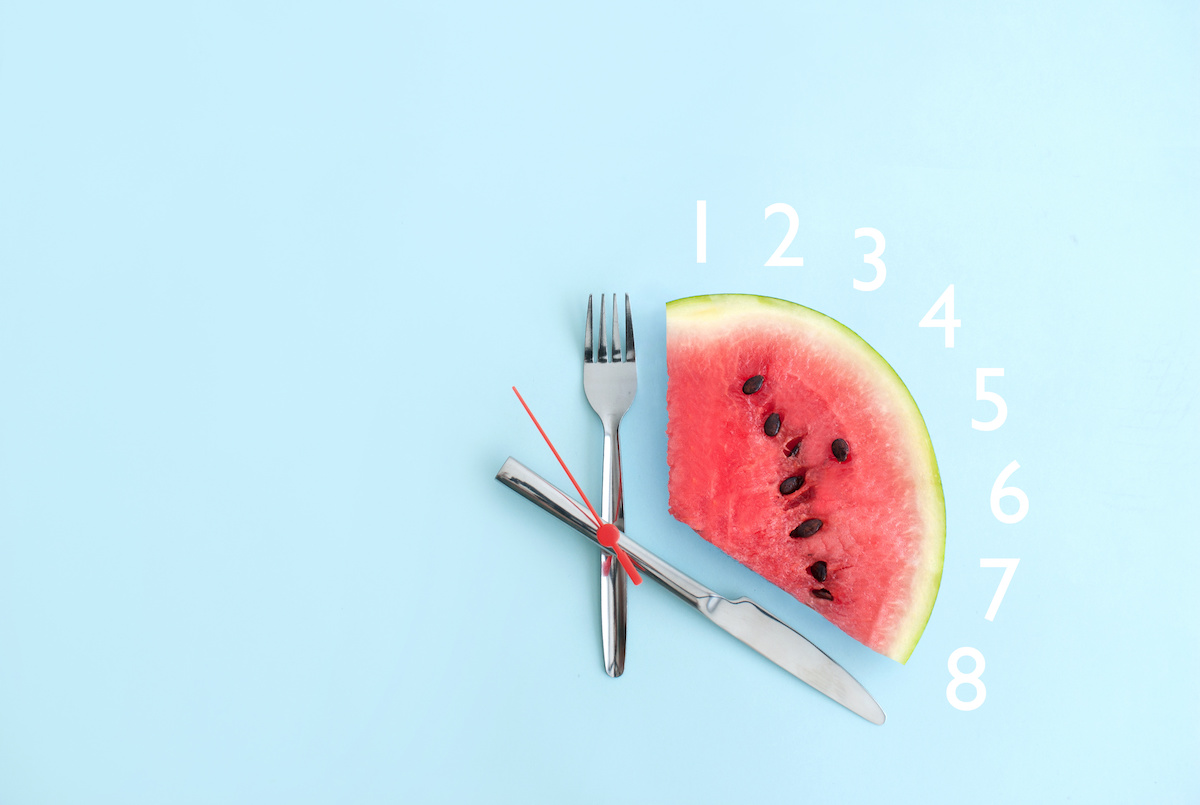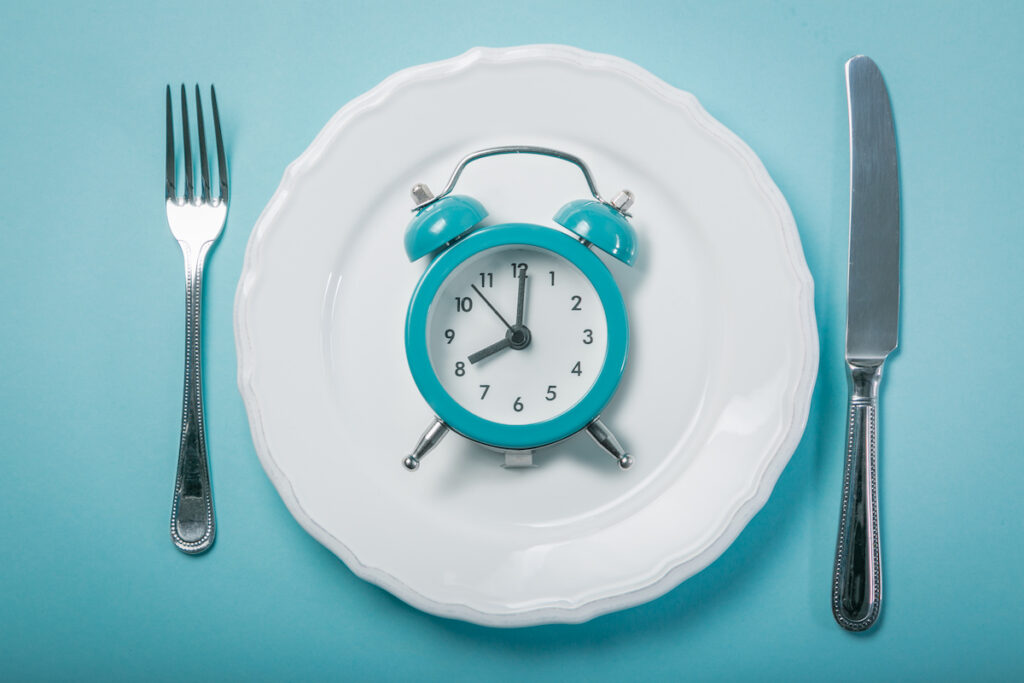Intermittent fasting (IF) is a buzzword you’ve probably heard before — and for good reason. It can provide numerous health benefits ranging from physical to mental. You might be considering IF for weight loss or even clarity of mind. If so, this guide can get you started.
This article will explain what intermittent fasting is and how to get started. You will also learn about what you can and can’t eat during periods of fasting. After this article, you should be well on your way to understanding the process.
The Science Behind Intermittent Fasting (What does it do)?
The benefits of intermittent fasting begin at a cellular level. When you go for a period without eating, the body begins making changes. Hormone levels increase to start making fat storage more accessible for burning. When the body doesn’t have incoming food for energy, it turns to fat as another source.
Along with additional fat accessibility, there are other changes that go on with the body.
- Insulin levels drop, which cues the body to begin burning fat.
- Human growth hormone levels can undergo a dramatic increase. Higher levels of this hormone relate to increased fat burning and muscle growth.
- Celluar repair begins in the body. This process allows to flush out excess waste. Cellular repair also can change the gene process.
Kicking into Ketosis
Once your body is in a fasted state, Your body enters another state: ketosis.
Ketosis happens when the body does not have enough carbohydrates to burn. Instead, it will burn fat for fuel and energy instead. Ketosis is a popular term that you may have already heard about with a low carbohydrate diet. Think of Atkins or of course the Keto diet. The idea is that the body uses fat as fuel, which can aid in weight loss.
When you are on a low-carb diet, it can take two to four days to go into ketosis. It depends on the person, or some people can find it happens quite quickly While others it can take a long time.
Keep in mind that fasting will not necessarily get you into a ketosis state faster. But a fasting regimen can help you go into ketosis more often, making it more effective for weight loss.

What to Eat or Drink When You Try Intermittent Fasting
Can I have cream in my coffee? There are plenty of questions that people ask about what to eat or drink when you’re intermittent fasting.
You’ll have to be careful about what you eat when you are fasting. Sometimes you can unintentionally break your fast without realizing it. Being aware of the proper foods and liquids to consume can prevent ineffective fasting periods later.
So, what can you eat or drink for intermittent fasting?
During the fasting period, the following foods and liquids are allowed:
- During your fasting, you are allowed to have water. However, it is best to stick to plain water and especially do not choose any sweeteners. Carbonated water is allowed as long as it is unflavored. If you choose flavored water, there is a potential that the sweeteners will break the fast cycle.
- Tea and coffee are also allowed when you are fasting. But just like water, both tea and coffee need to be consumed without any additives. This means that you need to hold the sugar and cream in your coffee or the milk for your tea. You also cannot add honey to tea, either. Some people find that small amounts of fat in coffee or tea can curb hunger, but be sure you research this before moving forward.
- Diluted apple cider vinegar is also acceptable during a fasting period. Adding two teaspoons of apple cider vinegar added to water may help prevent cravings while staying hydrated.
- Ingesting healthy fats can also be acceptable while you fast. Think of fats such as coconut oil or butter. An oil breaks fast, but the good news is that it will not take you out of ketosis.
Carefully studying the food and liquid that is allowed during a fasting phase we’ll save you a lot of headaches down the road. Once you have an idea of what you are allowed to consume during these periods, you can begin considering how to start intermittent fasting.
How to Start Intermittent Fasting
There is no universal way to do intermittent fasting. There are several methods that you can use and they can all be effective. The one that works best will depend on each person and their metabolism, along with a variety of other factors.
If you think you want to start intermittent fasting, these are a few of the most popular methods to consider.
16/8 Fasting Method
Made Popular by Fitness expert Martin Berkhan, the 16/18 fasting method has you fasting each day for about 16 hours. Once you enter your 8 hour window, you can eat as normal.
While not eating for an entire 16 hours may sound challenging, but you can include this timeframe into your sleeping hours. If you sleep for 8 hours at night, half of the battle is already done for your fasting period. You don’t even need for it to be awake for the fasting to take place!
Meanwhile, there are another remaining 8 hours of the day where you will need to steer clear of most foods and liquids. The easiest approach to this fasting method is to stop eating after dinner and Skip your breakfast the next day.
This method can pose a problem to people who are used to eating breakfast. After all, breakfast literally means “break fast”! However, you can help decrease feelings of hunger by drinking black coffee or filling up with water.
12 Hour Fasting
Another popular option is to fast for an entire 12 hours.
You can fast between the hours of 7 p.m. or 7 a.m. To make this method easy, plan to stop eating at dinner time, go to bed at a reasonable hour, and wake up for breakfast. This way, you won’t have a long time to wait if you want to eat breakfast as normal.
A 12 -hour fasting regimen is a good starting point for people who are new at IF. This is usually a doable amount of time for many people.
5:2 Fasting Method
With the 5:2 fasting method, this means that you will eat for 5 days during the week. However, 2 days during the week you will not eat anything at all.
This means that you will go an entire twenty-four hours without food, twice a week.
When choosing this method, most people will separate the day that they choose to fast. They might decide to fast on a Monday and then again on a Thursday. You should not fast for two days in a row, always separating the two fasting days with a normal eating day in between.
Alternate Day Fasting
Lastly, some people choose to do alternate-day fasting. This means that you will fast for one day, eat the next day, and repeat the process.
You might want to do a practice run and attempt fasting for an entire 24 hours. This way you can determine if this is going to be a sustainable method of fasting for you.
Can Intermittent Fasting Help You Lose Weight?
Yes, but only if you use intermittent fasting strategically. You cannot fast for 8, 12, or 16 hours a day and then consume a credible amount of calories during your eating window.
To use intermittent fasting as a successful weight loss tool, You must be mindful about the calories and the quality of food that you consume. This means that you should follow a healthy eating regimen, including plenty of fruits and vegetables as well as lean proteins.
This is by no means a reason to either starve yourself or overeat. Be mindful of the foods that you are eating. If you need extra help, you can always use a calorie counter app or seek the advice of a nutritionist.
When to Expect Results
How long does it take intermittent fasting to work? The answer to this really depends on your goals.
If you were looking to see a physical difference in your body, it can take about 10 days. You can lose up to a pound each week, possibly more depending on how much you cut back during your eating window. Remember that it is not about starving yourself for weight loss, but you want to eat as healthy and clean as possible.
You don’t want to expect your immediate weight loss results when you opt for intermittent fasting. You will lose a normal amount of weight, ranging from 1/2 pounds off to 2 pounds per week. You’re paragraph like any type of diet program, consistency counts!
Do you need help learning more about IF? Contact us at Generation Fit for custom plans catered to you and your goals!

